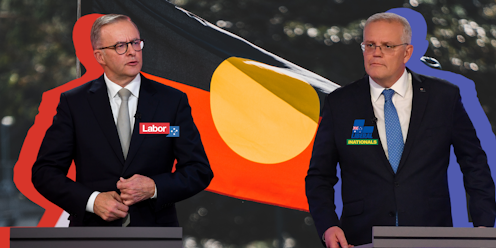Source: The Conversation (Au and NZ) – By Dani Larkin, Lecturer/Deputy Director of the Indigenous Law Centre, UNSW Sydney

AAP Image/Lukas Coch and Mick Tsikas, Shutterstock
One of the recommendations from the 2017 Uluru Statement from the Heart calls for the establishment of a First Nations Voice to parliament, enshrined in the Constitution. This would ensure First Nations people are formally consulted on government decisions and legislation affecting their communities.
However, for a Voice to parliament to be enshrined in the Constitution, it would need to be passed at a referendum.
A recent survey found significant public support for a First Nations voice to parliament.
However, it seems Labor and the Coalition are clashing on what this might look like in practice.
We asked five experts to grade the major parties’ policies and past actions on pursuing a Voice to parliament.
Coalition
Labor
![]()
Dr Dani Larkin is part of the legal team at the Indigenous Law Centre, UNSW that provides technical support to the Uluru Dialogue and community education on constitutional reform.
Eddie is part of the legal team at the Indigenous Law Centre, UNSW that provides technical support to the Uluru Dialogue and community education on constitutional reform.
Dr Emma Lee has consulted on the National Co-Design Group for Indigenous Voice. Dr. Lee has also received funding from the Australian Research Council Grant DP200101394 Making policy reform work: a comparative analysis of social procurement.
James Blackwell is a member of the Uluru Dialogue at UNSW, which is campaigning to support the Uluru Statement From the Heart and its sequence of constitutional reforms.
Sana Nakata receives funding from Australian Research Council (DP200100728; LP200200046).
– ref. How do the major parties rate on the First Nations Voice to Parliament? We asked 5 experts – https://theconversation.com/how-do-the-major-parties-rate-on-the-first-nations-voice-to-parliament-we-asked-5-experts-181162




